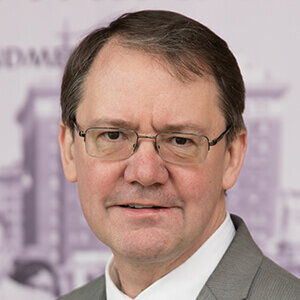
Professor Peter J. Hammer is the co-author of No Equal Justice: The Legacy of Civil Rights Icon George W. Crockett Jr.
Peter J. Hammer was named the A. Alfred Taubman Endowed Chair at Wayne State University Law School in fall 2018. Hammer has taught at Wayne Law since 2003 and is the director of the Damon J. Keith Center for Civil Rights. The Keith Center is dedicated to promoting the educational, economic and political empowerment of under-represented communities in urban areas and to ensuring that the phrase “equal justice under law” applies to all members of society. Hammer was instrumental in editing and compiling Judge Damon J. Keith’s biography, Crusader for Justice: Federal Judge Damon J. Keith (2013).
Hammer has expertise in the fields of domestic health law and policy, as well as international public health and economic development. He is a recipient of an Investigator Award in Health Policy Research from the Robert Wood Johnson Foundation, and served as lead editor for Uncertain Times: Kenneth Arrow and the Changing Economics of Health Care, a book published by Duke University Press (2003). Combining his training as an economist and a lawyer, his most recent book, Change and Continuity at the World Bank: Reforming Paradoxes of Economic Development (2013), takes on questions of international economic growth and development. His scholarship also has examined the role of global health initiatives in health system development and how international law might further the objectives of global child health.
Hammer has spent more than 25 years engaging issues of human rights, law and development in Cambodia. He was a founding board member and past president of Legal Aid of Cambodia, an organization providing free legal services to Cambodia’s poor. He is presently a board member of the Center for Khmer Studies and the Life and Hope Association, an organization in Siem Reap, Cambodia, founded and run by Buddhists monks to address the needs of orphans, vulnerable children and at-risk young women.
Detroit has been the site of many civil rights and labor rights battles, and many notable Black attorneys have called the city home. The first Black president of the ABA, Dennis Archer,...
Subscribe to receive featured episodes and staff favorites once a month.
Newsletter Signup